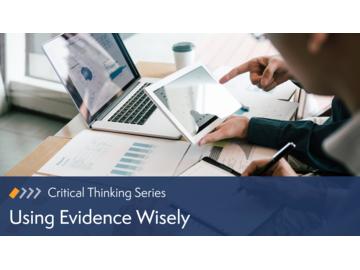Critical Thinking: Using Evidence Wisely
5 mins! Run Time
Employees
only
Provided
Friendly
Access
What you'll learn
Key Words
Description
Arguments are supported by evidence, but not all evidence is relevant, factual, and valuable. Solving a problem with critical thinking requires careful analysis of the evidence to determine if and how the evidence should be used to help you reach a solution. Once you’ve identified the qualified evidence, you can determine whether there is enough valid support for the arguments that will influence your decisions.
Objectives:
- Distinguish between facts, opinions, and projections
- Determine whether your evidence is factual and relevant
- Ask questions to determine the value of your evidence
Course Features: Audio Narration, Video, Job Aids and Reference Materials
System Requirements
Supported Browsers: Chrome; Microsoft Edge; Firefox; Internet Explorer 9; Internet Explorer 10; Internet Explorer 11; Safari
Mobile Ready: Yes
Critical Thinking: Using Evidence Wisely

Arguments are supported by evidence, but not all evidence is relevant, factual, and valuable. Solving a problem with critical thinking requires careful analysis of the evidence to determine if and how the evidence should be used to help you reach a solution. Once you’ve identified the qualified evidence, you can determine whether there is enough valid support for the arguments that will influence your decisions.
Objectives:
- Distinguish between facts, opinions, and projections
- Determine whether your evidence is factual and relevant
- Ask questions to determine the value of your evidence
Course Features: Audio Narration, Video, Job Aids and Reference Materials

